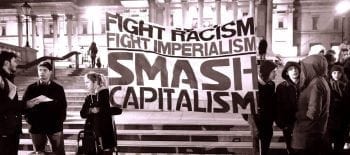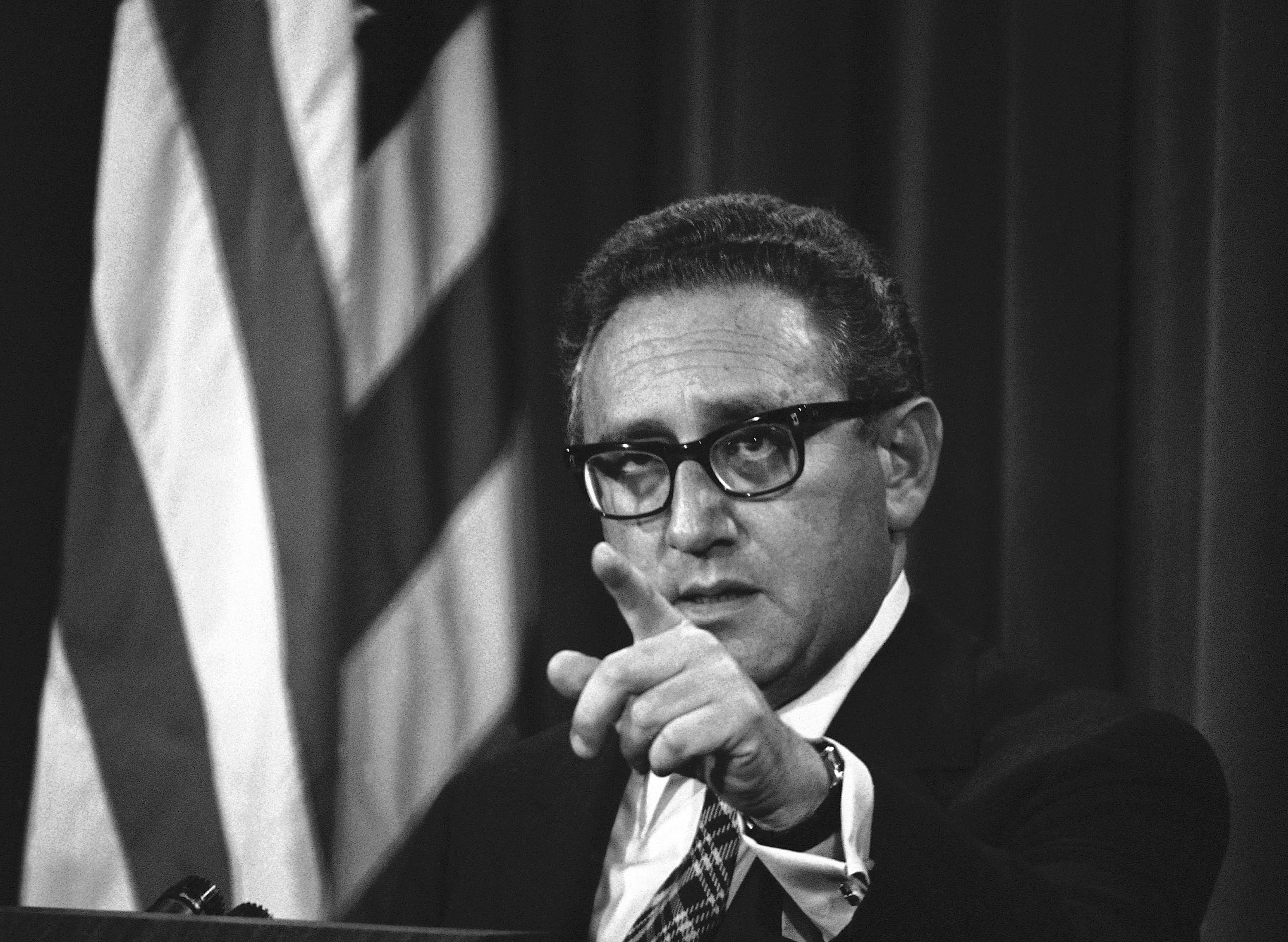Gary Olson
In a parallel universe, Henry Kissinger is being prosecuted for war crimes and crimes against humanity before the International Criminal Court at The Hague in the Netherlands. Seated at the table with Kissinger is his cunning choice for Chief Defense Counsel, none other than Karl Marx.
The ICC’s Chief Prosecutor addresses the three-judge Trial Chamber, reminding them that the preamble of the Rome Statute establishing the court states “that the most serious crimes of concern to the international community as a whole must not go unpunished.”
She draws upon a myriad of impeccable sources, including historian Greg Grandin’s new book Kissinger’s Shadow. The judges are stunned by the prosecutor’s searing portrayal of the defendant’s alleged responsibility for so many deaths — six million in Indochina alone. An anguished look crosses the face of Norwegian judge Olaf Ingeborg as he watches some unspeakably macabre visual evidence.
A guilty verdict seems inevitable.
Kissinger’s chin falls to his breast as Marx, a man demonized in the West for some 175 years, rises to address the judges. Not only does Marx readily concede the veracity of the prosecution’s evidence, he adds a few graphic details about the defendant’s role in the East Timor genocide. Kissinger thinks he mishears when Marx adds, “Dr. Kissinger’s behaviour was not a result of unusual circumstances, honest mistakes, or individual ambition.”
Kissinger is distraught as his legal counsel has seemingly hammered the final nail into his coffin. For the first time in his life, Kissinger wonders if he has outsmarted himself by choosing Marx to save him from prison and an ignominious legacy.
But then Marx continues:
“Honorable justices, I have not come to The Hague to send Dr. Kissinger to prison. And I’m sure it was an oversight when my learned friend, the Chief Prosecutor, neglected to mention that the defendant received the Nobel Peace Prize, or that President Obama recently bestowed on my client the Distinguished Public Service Award, the Pentagon’s highest honor for a civilian.
“By his own lights and conscience, my client is a bona fide civilian war hero acting on firm principles of objective necessity.
“Facts, without any appreciation for context and motives, are not germane to arriving at a guilty verdict. I submit to you that the ‘facts’ presented here today are only the end result of certain policies.
"Facts, without any appreciation for context and motives, are not germane to arriving at a guilty verdict..."
“Esteemed members of this tribunal, if you can set aside any preconceived notions, here are the ‘actual’ facts of the matter, something you may not have learned in Economics 101. Dr. Kissinger operated under the global capitalist moral imperative that ‘requires’ the endless accumulation of capital on the one hand and escalating impoverishment on the other. Once you accept this fact, you surrender autonomy, and other options cease to exist. If economic disparity is necessary, suppressing radical efforts to reduce it are ethically justified.
“Remember, I wrote the book on class struggle — three volumes, in fact — and the mantra of the capitalist is, ‘Accumulate! Accumulate! This is Moses and the Prophets.’ Expand or perish! The chronic crises produced by this system must be addressed, sometimes in the most brutal and barbarous fashion. And the defendant would be the first to tell you that he was the quintessential geostrategic game player of his era.
“I know these accusations against Dr. Kissinger call to mind the Nuremberg trials after World War II, the grainy images of Goering, Frank, Streicher and Hess. But would the surviving Nazi officials have been accorded the praise, honour, and gratitude that have accrued to Dr. Kissinger?
“Here’s the critical distinction: The Nazi term for those they exterminated and/or exploited was Untermenschen — subhumans. By contrast, the basic humanity of the casualties associated with Dr. Kissinger’s crimes was never in doubt. It’s only that their lives mattered slightly less than some other lives, perhaps including your own.
“Millions of innocent people did not deserve to die. But the defendant knew that incalculably grotesque violence — so many killings — had preceded his time in office. Many of the survivors felt aggrieved, and, because they no longer feared death, they posed either an imminent or eventual threat to the post-WWII international order. He was conversant with Ernesto ‘Che’ Guevara’s declaration that ‘there are no boundaries in this struggle to the death’.
He was conversant with Ernesto ‘Che’ Guevara’s declaration that ‘there are no boundaries in this struggle to the death’.
“Unlike the Nazis, Dr. Kissinger wasn’t ‘just following orders’ from his superiors, but obeying a higher law, the sometimes brutal but unyielding first law of capitalism that I spoke of earlier. He believed the service he performed was a moral act. As Dr. Kissinger has advised us more than once, ‘We must learn to distinguish morality from moralizing.’
“Esteemed justices, it’s easy to blame statesmen for errors in judgment, and sometimes it’s justified. But here we have an individual who assumed the awesome responsibility of burning Vietnamese children alive with napalm in order to protect his country’s free market system, a system which is now the world’s dominant economic system. And he’s hardly been alone in assuming this moral obligation.
“Recall this exchange, aired on 60 Minutes in 1996 between Leslie Stahl and former U.S. Secretary of State Madeleine Albright regarding U.S. sanctions on Iraq:
Stahl: We have heard that a half million children have died. I mean, that’s more children than died in Hiroshima. And, you know, is the price worth it?
Albright: I think this is a very hard choice, but the price — we think the price is worth it.
“Later, sensing her compassion and empathy might be in doubt, Albright added, ‘I regretted coming across as cold-blooded and cruel.’
“And during Secretary Clinton’s watch, Libya descended into a failed state on the heels of the U.S.-led intervention. Later, hundreds of children perished at sea when their refugee boats sank. But Dr. Kissinger’s disciple championed the U.S. role because she knew that Col. Gaddafi’s insolent noncompliance with Washington made him an impediment for U.S. investors in gaining critical access to resource-rich Africa. She was abiding by the adage of her mentor, Dr. Kissinger, who sagely said, ‘The absence of alternatives clears the mind marvelously.’ She acted on objective reality. But lest you suspect this make Secretary Clinton a moral monster, recall her pledge that ‘every child in America should be able to reach his or her God-given potential.’
“Finally, and not to belabour the point, but aren’t President Obama’s Hellfire missile-armed Reaper drones that vaporize children only abiding by this same economic and moral calculus? Remember what I said about mere ‘facts’ divorced from motives. It’s the distinction between human facts and strategic facts. Obama, like Kissinger, believes he’s acting virtuously on behalf of advancing the interests of the penultimate economic system ever devised by humans, the Holy Grail of modern economics for the entire world. And recall that Obama also received the Nobel Peace Prize.” Again, Norway’s Judge Ingeborg’s face registers discomfort.
Aren’t President Obama’s Hellfire missile-armed Reaper drones that vaporize children only abiding by this same economic and moral calculus?
“Honorable judges, we can all agree that The Netherlands is a most felicitous setting, but do you really want to spend the remainder of your term putting leaders on trial for simply doing their jobs?
“Finally, to convict the defendant of these charges, you must be convinced the prosecution has established guilt beyond a reasonable doubt; in legal terms, it’s sometimes called moral certainty. If you believe the alleged crimes could have been committed due to circumstances, conditions, and causes not contained in the indictment, you must vote for acquittal. Your vote is a profoundly moral one that will determine the fate of another human.
“Honorable justices, the defense rests.”
After Marx’s statement, Kissinger notices confusion and even doubt creeping onto the faces of the three judges. Inwardly, he congratulates himself.
An intense deliberation ensues. The Australian justice says, “As to the death of children — the most vexing charge we heard — my husband and I have a precious new granddaughter, so it’s not abstract for me. I know I may sound harsh, but, given the wretched conditions confronting the poor and given the world’s frightening overpopulation problems, this suffering will only become more pronounced. To Herr Doktor Marx’s point that Dr. Kissinger’s actions were morally necessary to save the system, couldn’t we add that the deaths of these children— unusually and mercifully swift — was a prophylactic measure? This policy protected not only our long-term interests, but theirs as well. Finally, I’ll say out loud what many are thinking: A certain percentage of these adorable children would have grown up to be terrorists.”
I’ll say out loud what many are thinking: A certain percentage of these adorable children would have grown up to be terrorists...
Jamaica’s Justice Michael Cooper responds, “I’m leaning towards acquittal, but for very different reasons. If we convict the defendant, aren’t we letting the system off the hook, making Kissinger the scapegoat, and feeling self-righteous about it? Part of me wishes capitalism, itself, could be in the dock.”
Judge Ingeborg is largely silent, confining himself to rereading the portion of the official transcript describing moral certainty.
Finally, after two days, an acquitted Kissinger walks free.
The drained and visibly relieved defendant approaches Marx, extends his hand and effuses, “Dein Genie hat mir sowohl mein Leben als auch mein Vermächtnis gerettet. Danke! (Your brilliance has saved both my life and legacy! Thank you!)”
Marx brushes the hand aside and, refusing to speak German, mutters, “I don’t shake hands with mass murderers.”
Kissinger stammers, “But, but, you . . .”
Marx cuts him off. “I defended you because it gave me an opportunity on the world stage to explain how saving humanity, and saving the world, requires eliminating the power of the capitalist class, not individuals. And there’s precious little time.
“A guilty verdict would have been personally gratifying, but it would have been a misdirection, a distraction from the truth. My statement identified the ultimate guilty party. As someone said in a different context, I think the price for your acquittal is worth it. And speaking of precious little time, I saw the Grim Reaper lurking in the parking lot next to your car. Auf wiedersehen, Dr. Kissinger!”
This article can be read in full, along with correspondences with Robert Walpole, W.M. Thackeray and William Wood, on Arts and Opinion.
 Gary Olson is a member of the Political Science Department at Moravian College in Bethlehem, PA.
Gary Olson is a member of the Political Science Department at Moravian College in Bethlehem, PA.
Featured image via nycturk.com
The views expressed herein are solely those of the author and may or may not reflect those of The Greanville Post. However, we do think they are important enough to be transmitted to a wider audience.
If you find the above useful, pass it on! Become an "influence multiplier"!
The battle against the Big Lie killing the world will not be won by you just reading this article. It will be won when you pass it on to at least 2 other people, requesting they do the same.
| Did you sign up yet for our FREE bulletin? It's super easy! Sign up to receive our FREE bulletin. Get TGP selections in your mailbox. No obligation of any kind. All addresses secure and never sold or commercialised. [newsletter_form] |
![]() This work is licensed under a Creative Commons Attribution-NonCommercial 4.0 International License
This work is licensed under a Creative Commons Attribution-NonCommercial 4.0 International License









